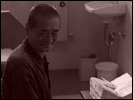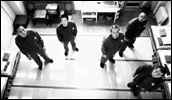Doing Time
- Year
- 2002
- Original title
- Keimusho no naka
- Japanese title
- 刑務所の中
- Director
- Cast
- Running time
- 93 minutes
- Published
- 6 November 2006



by Tom Mes
The Japanese adhere to a theory that a person's basic personality is dictated by his or her blood type. A-types are neat and orderly, B-types their opposites. AB's have a bit of both and tend more toward the capricious, while having type 0 is a sure sign of leadership qualities. From his films it's rather hard to tell what blood type director Yoichi Sai has, though someone who can go from the cuddly canine story Quill to the ferocious Blood and Bones without batting an eyelid could be considered more than a bit erratic. Doing Time, however, is unmistakably an A-type film.
Based on an autobiographical manga by Kazuichi Hanawa, Doing Time is a prison film. Or at least, it's set inside a penitentiary. The prison film is a genre with a rigid set of codes, but none of these have any place in this particular outing. Doing Time is not about hell behind bars, but about the joys of regimented living. To amateur gun freak and survivalist Hanawa (Yamazaki), the military discipline that reigns the Hokkaido jail complex where he has been sent to purge the three-year sentence for proving that his home-made replica Magnum actually worked, is right up his alley. The film chronicles his day-to-day existence, slipping more and more comfortably into the tightly reined regime where everything is prescribed to the tiniest detail: how to walk, where to stand, how to fold your sheets and how quickly to do it all. This prison is not a penitentiary in the true sense of the word, but rather a factory that produces pointless precision.
But it's precisely in this pointlessness that the point lies. The mundanity turns the most minor detail into a major event. The inconsequential ceases to exist and the smallest occurrence can become a source of resonant bliss. Hanawa and his four cellmates devotedly debate the lifespan of the batteries in their electric razors, attempt to identify the origins of pubic hairs wiped off the tatami floor, admire each other's skill at folding laundry, and exchange the latest gossip about fellow inmates. Day in, day out, time and again, and all the while Hanawa's voice-over provides running commentary in the most contented of tones. No greater joy exists among all this trivia than mealtime. Every plate and dish is scrutinised, properly identified and categorised by Hanawa's comforting drone. When he is sent to solitary for "unauthorized communication", he finds that he is even more at home in this one-man cell, observing rays of sunlight and driving himself to new heights of performance in his daily task of folding paper bags.
All this might strike some as akin to watching paint dry, but we come to find in the calm repetition and steady cadence of Sai's film a similar revelatory experience as its protagonist. As the camera either glides along in linear movements or sits, contentedly almost, in a fixed position, Sai captures the minutiae of his characters' existences. With a mostly classical music soundtrack, he creates a sublimely rhythmic film, one that Yasujiro Ozu might have come up with if only someone had had the nerve to hire him to direct Birdman of Alcatraz.
One can approach the film's portrayal of the Japanese penal system with whatever political slant one wants: feel that Hanawa and his fellow inmates are treated like robots or, inversely, with kid gloves; we can see the neat, programmed routine as either dehumanisingly absurd or as a revelatory model of prison reform. There is tons to be said about the prison regime's reflection of the hierarchical, group-based order in Japanese society at large too. As a work of cinema, though, what matters most is how well Doing Time records that seemingly mundane thing that nevertheless so few filmmakers ever manage to capture: human behaviour.